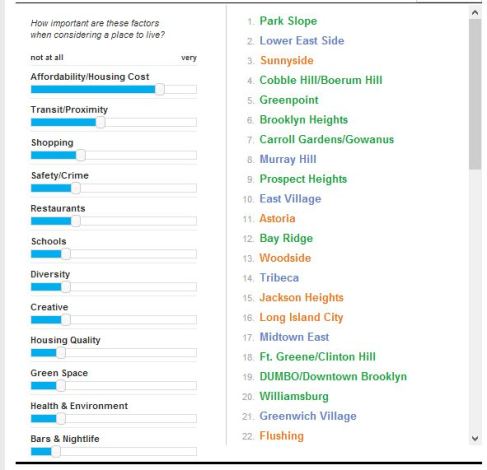Seriously, if I knew the answer to this question, I’d be writing now from my $3000 per month, no fee, Nolita duplex with ‘roof rights’. Rather than tapping this out on H1B’s work laptop in our dingy corporate studio (my beloved ancient Mac was officially declared deceased by Henry the genius at the Mac shop on 5th and 58; time of death 14:10), nursing a cold Victoria Prima Pils, with StreetEasy and the rental section of the New York Times glaring at me from the other tabs.
>> YOU SHOULD SEE: Do I use a broker or Craigslist?
But I’ll try and share my new wisdom – and those snippets of realtor sageness passed on by every New Yorker we’ve met. New Yorkers are absolutely evangelical about where is the best/worst place to live in Manhattan and Brooklyn (the other boroughs don’t figure, apparently) – and all of them say different things. Hope it helps; as the H1B goes off to his Hudson River-views desk every day, the bulk of the apartment hunting may well be left to the Trailing Spouse.
Here are my top tips:
1. Know the area you want to live in.
Even on a casual visit to New York, you’ll realise that the city’s districts have distinct personalities. Chelsea is urban, art-loving and gay; UES is gentile, by the park and slightly dull; East Village is full of hip young things and $5 cuba libres; West Village is where Sex & the City was filmed and you can’t afford it; Brooklyn is where the cool, alternative and slightly smug breed. Etc. Spend a bit of time visiting each area and see if you like the feel.
2. Decide whether you want to pay a broker
Depending on your view, a broker is either someone who has access to all the best properties in a tough and over-subscribed market, or a money-leeching cad who demands 15% of your annual rental expenditure for making a few phone calls and repeatedly saying ‘not possible’ to any specifications you may have about the four walls you want to inhabit, while answering another phone call from another hapless (and possibly British) ex-pat unfortunate. In simple terms, rentals are either ‘brokered’ or ‘full fee’ where the full fee is going directly to the landlord.
3. Get your paperwork ready
When you find the apartment of your dreams (the modest dream which takes budgets and timelines into consideration), you’ll need to act quickly. If you have recently arrived, you’ll need a letter on company paper stating your employment details and salary – including bonus details, the cheeky blighters. You’ll need to open a bank account and have some funds in it. Typically, you’ll need the first month’s rent and the last, and the broker’s fee if you have gone with one – and you’ll need that all up front and ready to go.
4. Watch the hidden fees
Many New York apartments come with doormen – who, again, are a necessity or an expense depending on how you look on them. A doorman will take your deliveries, sign for mail and groceries, monitor visitors (no random door-knockers), arrange to have your loo unblocked, and generally look impressive in their C18th Italian military apparel when your friends come to stay. But you pay for them; as you will pay for basement gyms, roof-top terraces, water features in the lobby. Some landlords demand you have a maid (no skin off my nose), monthly maintenance fees which can range from a couple of hundred dollars to over a thousand dollars a month.
5. Set a budget
… and don’t lose your mind. Remember that brokers, agents and everyone else who has their thumb in the tasty realty pie will try to get every extra cent and dollar out of your wallet. And it’s much easier to look when you have firm budget boundaries and a clear idea on the geographical area you want to live in.
Read Full Post »
 When the H1B and I looked at where to permanently live in New York – after a brief spell in a tiny, hot studio on 66th and 1st, and a month in the iconic (but covered in scaffolding) 15 Park Row building near City Hall – we turned to Google.
When the H1B and I looked at where to permanently live in New York – after a brief spell in a tiny, hot studio on 66th and 1st, and a month in the iconic (but covered in scaffolding) 15 Park Row building near City Hall – we turned to Google.